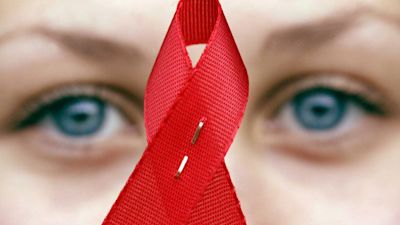World AIDS Day: 'Be open about HIV status to challenge stigma' says LGBT+ campaigner in Wales

World AIDS Day is being marked across the globe today to remember those lost to HIV and those still living with the virus.
The World Health Organisation estimates around 80 million people across the globe have been infected with HIV and around 36 million have died from an AIDS related-illness.
World AIDS Day is not only a reminder of the work being done to eradicate the virus, it is also a chance to challenge the the stigma that still exists for many people.
Changing the perception around HIV is something that Lisa Power has spent her life working on. She is a sexual health and LGBT rights campaigner and says although the stigma around HIV has changed, it is still very much there.
She says it is particularly a problem in Wales.
"When I moved to Cardiff 15 years ago, I was really surprised and I continue to be surprised at how few people are prepared to talk openly about their HIV diagnosis, in fact most of the Welsh people who are open about their HIV status seem to live in England.
"There is still real ignorance here and that is a chicken and egg situation, we're only going to get rid of that ignorance if everybody is much more straight forward and better informed about HIV but people with HIV are scared to step forward and talk about that because they know they're going to be met with ignorance.
"You have to be quite resilient to know that somebody is going to be ignorant about you and that you're going to have to plough through that to get them to understand.
"Actually, if you do that it's incredibly worthwhile and my friends who are open about their HIV status are very resilient people. I think it puts a real mental toll on you to keep a big part of your life silent like that.
"It's like being in the closet about being gay except slightly more fatal if you're not careful."
Lisa first became more aware of the virus when she worked at Switchboard LGBT+ helpline, which was more commonly known as Gay Switchboard in the 1980s. But HIV was still very much unknown then and went by the name GRID- Gay Related Immune Deficiency.
As time went on, Lisa says the stigma got worse around AIDS and that left an unwanted legacy.
"People would say I'm terrified that someone might have AIDS and we'd go, you're not having sex with them, you're not sharing injecting equipment with them what's your problem?
"I was always astounded by the completely unreasonable prejudices that people show but I learnt that they came from ignorance.
"That's why one of the most important things we can do is to support people with HIV to speak up and actually to show everybody is human and that prejudice is ignorance."
"The stigma is still out there and people are still operating on a set of beliefs around AIDS in the 1980s and we have to get rid of that.
"We have to get people to understand that HIV is now a chronic condition and people should be encouraged to find out if they have it and encouraged to get on treatment and remain well. "
Making sure that people are properly informed about the virus has also been the life's work of Lord Norman Fowler.
As an MP, he spent time as Health Secretary from 1981 to 1987 in Margaret Thatcher's Conservative Government, and first drew the public's attention to the dangers of AIDS.
One notable legacy was leading the Don't Die of Ignorance campaign, which was a public health message instructing the UK population on the importance of practising safe sex.
The Government believed millions of people could be infected with HIV/AIDS and produced a TV advert making the public aware of it as well as sending a leaflet on the virus to every home in the country.
Looking back on it, Lord Fowler says he thinks it was the right message.
“I think that we were wise to treat it as a public health issue and I think the public understood this and they wanted some guidance on what this was all about and I think whatever else we did give them that.
But he also says the stigma that still exists around HIV must change if progress is to be made today. The former speaker of the House of Lords has said he will spend the rest of his career trying to combat it.
Here is part of his interview on Monday night's ITV Sharp End with Rob Osborne.
Support services
Read more: